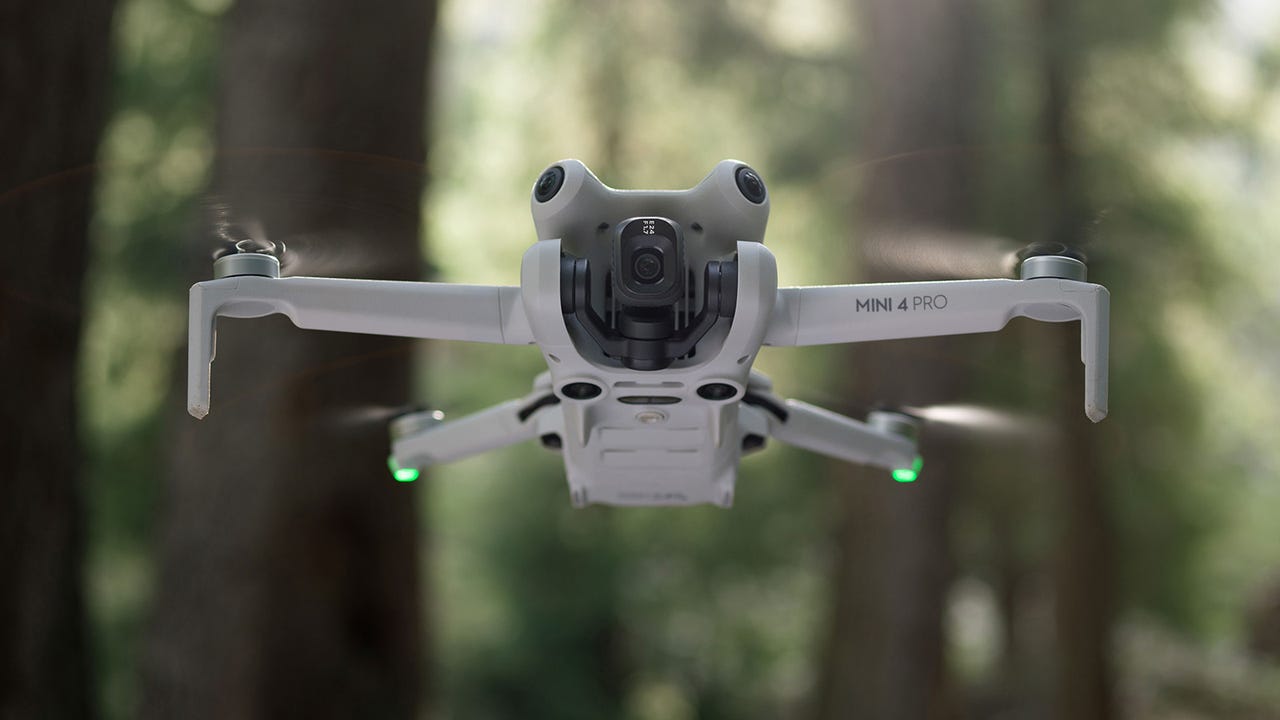
































Several readers have directed me to aDroneXLarticle reporting that the latest firmware update for certain drones has "inadvertently made these devices illegal for commercial use" in the US.
The drones in question are DJI's popular lightweight models, theDJI Mini 3 andDJI Mini 4 Pro .
Also: The best drones you can buy
To grasp the issue, we need to examine both the firmware update that DJI released for the drones in question as well as the Federal Aviation Authority's (FAA) extensive regulations regarding drones.
Firstly, regarding the firmware updates: The release notes for the DJI Mini 4 Pro update on December 2, 2023, can be found here, and the notes for the DJI Mini 3 update on January 25, 2024, are available here.
The update detail causing concern is as follows:
Added support for automatically activating the US Remote ID only when the aircraft is used with an Intelligent Flight Battery Plus .
At first glance, it's just one line, but -- to understand its importance -- there's significant context to unravel.
With the increasing number of drones buzzing around the skies, the FAA determined a need for a system that would enable drones in flight to broadcast identification and location information to various parties, including but not limited to, other pilots, the FAA, and law enforcement and other federal agencies.
The mandate for Remote ID was legislated, with a compliance deadline of September 16, 2023. Drones requiring registration, used for recreation, business, or public safety, needed to adhere.
Newer drones came with built-in Remote ID capabilities, while older models required additional modules for compliance.
However, due to several factors, such as the limited availability of Remote ID-compatible broadcast modules for existing drones lacking Remote ID, the FAA recognized that some drone operators might struggle to meet the requirements. As a result, it issued a notification stating that for Remote ID violations occurring on or before March 16, 2024, it would "consider all circumstances... when exercising its discretion in determining whether to take enforcement action."
Therefore, if you're mandated to use Remote ID and are flying without it between September 16, 2023, and March 16, 2024, you should have a substantial justification.
But which drones need Remote ID? The answer isn't straightforward.
To answer this, we delve into the FAA's regulations once more. Two key pieces of guidance emerge:
What this means is that if you're a recreational flyer with a drone under 0.55 pounds/250 grams, you don't need Remote ID. However, commercial drone pilots must comply with Part 107 rules (yes, more rules), and their drones must have Remote ID.
Also: My search for the best cheap Android tablet is over
Note that both the Mini 3 and Mini 4 Pro are sub-250-gram drones when equipped with the standard battery. DJI also offers a larger, heavier Intelligent Flight Battery Plus, which increases the drone's weight beyond 250 grams.
Revisiting the wording in the release notes:
Added support for automatically activating the US Remote ID only when the aircraft is used with an Intelligent Flight Battery Plus.
This means recreational pilots flying a Mini 3 or Mini 4 Pro with a standard battery don't require Remote ID. However, the introduction of a larger battery triggers the Remote ID automatically.
Also: Mavic 3 Pro: Hands-on with the best drone for content creators
This is acceptable for recreational use.
The problem arises for commercial pilots. When flying with the standard battery, the drone still requires Remote ID for commercial purposes, but there's no manual activation option, as it's automatically controlled, rendering the drone non-compliant.
Bottom line, commercial pilots operating under Part 107 flying the Mini 3 or Mini 4 Pro must kit their drones with an Intelligent Flight Battery Plus to remain lawful.
If flying without the Intelligent Flight Battery Plus, then yes.
It seems likely. I've reached out to DJI for a statement and will provide updates upon response.
You have a few options.
My advice is to buy an Intelligent Flight Battery Plus and install it in your drone to enable Remote ID. The additional battery life alone is beneficial, especially for commercial pilots.
Also: This foldable drone fits in the palm of my hand and takes the best selfies
Note:Make sure you purchase a genuine DJI battery. The savings from a cheaper, lower-quality alternative will be insignificant if a battery failure results in losing your drone.
Alternatively -but bear in mind I am not a lawyer -you could carry on flying as usual until March 16, 2024, and hope that the FAA exercises its discretion if you are caught.
No.
If you fly with the standard battery then your Mini 3 of Mini 4 Pro will be below 250 grams and you don't need Remote ID. If you fit the bigger battery, then Remote ID will be automatically activated for you.
 Etiquetas calientes:
innovación
Etiquetas calientes:
innovación